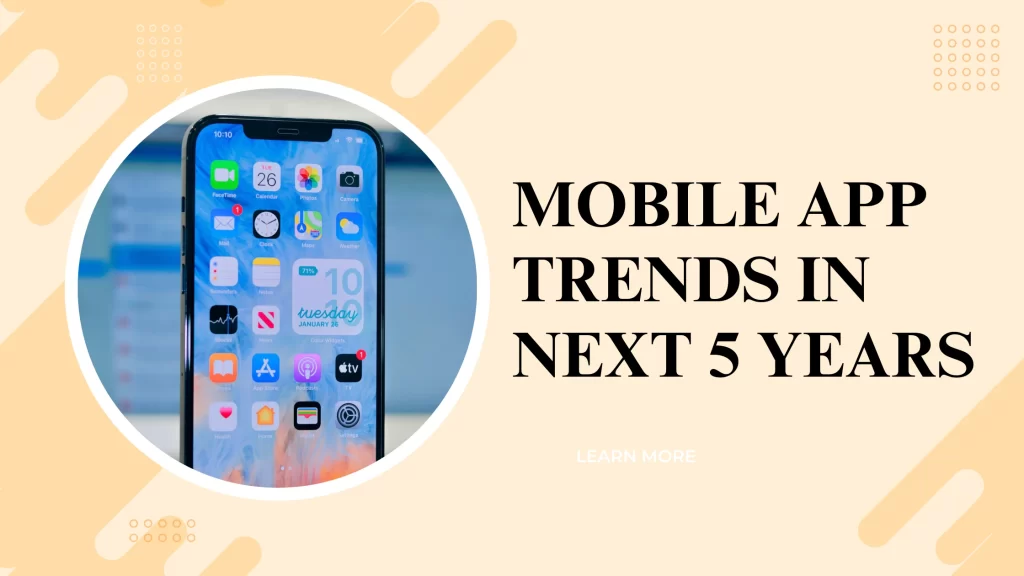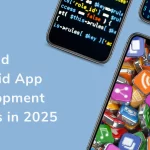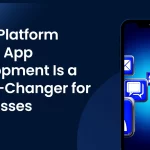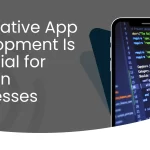Mobile App Development Future and Key Trends to Watch
Mobile App Development Future is constantly evolving with new technologies shaping how we use digital applications. In the next five years, advancements in AI, AR, 5G, and blockchain will transform how mobile apps are developed and experienced, driving innovation and user engagement.
AI & ML Integration In Mobile App Development Future
AI and ML are making mobile apps smarter with personalized experiences, predictive analytics, and automation. Chatbots and virtual assistants are improving customer support, while AI-driven automation enhances tasks like image recognition and fraud detection. Businesses use AI to boost efficiency and enhance user experiences.
Natural language processing (NLP) is advancing voice search and real-time translation, making app interactions more natural. AI also strengthens security with biometric authentication and threat detection. Additionally, AI-powered tools simplify coding, testing, and debugging. Mobile App Development Future will be shaped by these innovations, making apps more intelligent, secure, and efficient.
Focus on App Security and Privacy
With the rise of cyber threats, mobile app security has become a top priority. Future mobile applications will feature biometric authentication, advanced encryption, AI-driven threat detection, and secure API development to safeguard user data.
As cyber threats increase, keeping mobile apps secure is more important than ever. Future apps will use biometric logins, strong encryption, and AI to detect threats and protect user data. Mobile App Development Future will focus on safer app designs, strict privacy rules like GDPR, and advanced security methods to block hackers and prevent data leaks.
Internet Of Things (IoT) Expansion
IoT in mobile applications will continue to grow as smart devices become more prevalent. Future developments will include:
- Mobile apps will enable users to control connected devices such as thermostats, security cameras, lighting, and appliances remotely.
- Fitness trackers, smartwatches, and health-monitoring devices will synchronize seamlessly with mobile applications, providing real-time data and insights.
- IoT-powered mobile apps will enhance manufacturing, logistics, and supply chain management through real-time monitoring, predictive analytics, and automated workflows.
- IoT-integrated mobile apps will facilitate remote patient monitoring, smart medical devices, and AI-driven diagnostics, improving access to medical services and patient outcomes.
- IoT applications will optimize urban infrastructure by enabling smart traffic and waste management, as well as energy-efficient solutions.
- Businesses will use IoT-powered mobile applications to track and manage vehicles, shipments, and assets, enhancing operational efficiency and reducing costs.
- IoT-enabled mobile applications will assist farmers in monitoring soil conditions, automating irrigation systems, and tracking livestock health, thereby improving productivity and sustainability.

Super Apps- The All-in-one Mobile Experience
Super apps are becoming more popular, combining messaging, shopping, payments, and transport in one platform. Inspired by apps like WeChat and Paytm, they offer convenience and boost user engagement. However, challenges like security, performance, and regulations must be addressed. Mobile App Development Future will likely see wider global adoption of super apps as more companies embrace this trend.
Voice Search and Conversational UI
Smart assistants like Siri, Google Assistant, and Alexa are increasing the demand for voice-enabled apps. Voice search and conversational UI improve accessibility and user experience, making interactions more natural. Mobile App Development Future will focus on enhancing speech recognition with NLP, expanding voice commerce, and optimizing apps for seamless voice interactions across devices.
Cloud–Based Mobile Applications
Cloud computing is transforming mobile apps by reducing storage needs and enabling access across devices. It enhances security, real-time syncing, and scalability while lowering costs for businesses. Mobile App Development Future will see more cloud-based, high-performance apps benefiting industries like healthcare, finance, and education.
Cross-Platform App Development Advancements
The rise of cross-platform frameworks like Flutter and React Native is making app development faster and more cost-effective. These technologies let developers use one codebase for both iOS and Android, improving efficiency. Mobile App Development Future will see further advancements in performance, UI responsiveness, and seamless integration, making cross-platform apps even more powerful.
On-Demand Apps Evolution
On-demand apps are changing industries by offering quick access to services like food delivery, ride-sharing, and healthcare. AI enhances user experience with personalized recommendations, while wearables improve accessibility. Mobile App Development Future will focus on AI automation, contactless payments, and faster service delivery to enhance convenience.
Conclusion
The future of mobile app development is set for groundbreaking advancements, driven by AI, 5G, blockchain, AR/VR, and IoT. Developers and businesses that embrace these trends will gain a competitive edge in delivering innovative, high-performance, and secure mobile applications. As technology evolves, mobile apps will become smarter, faster, and more immersive, transforming how we engage with digital experiences.










